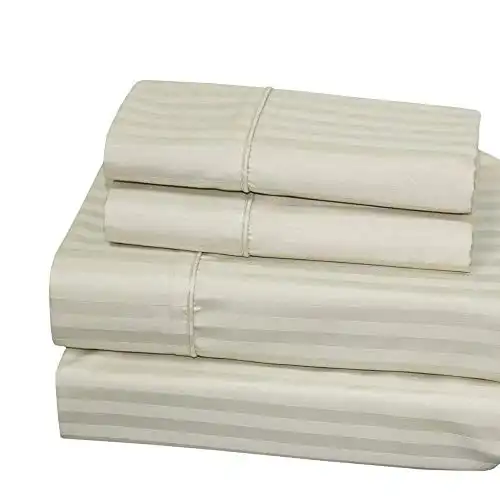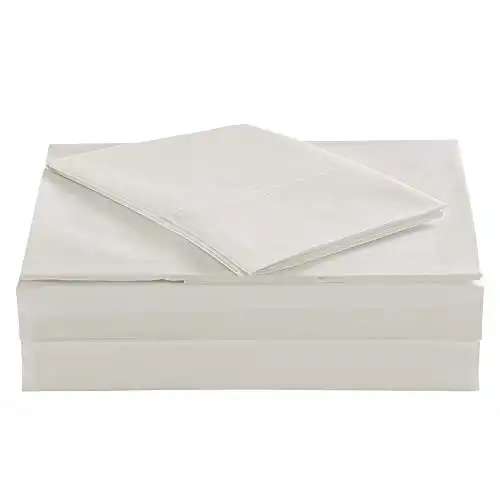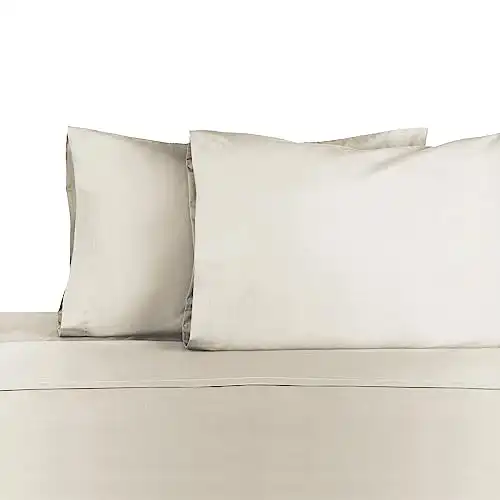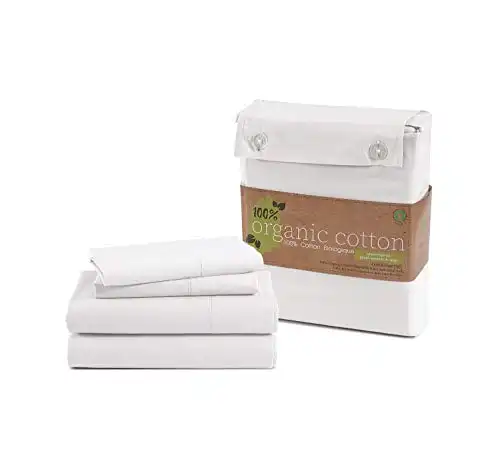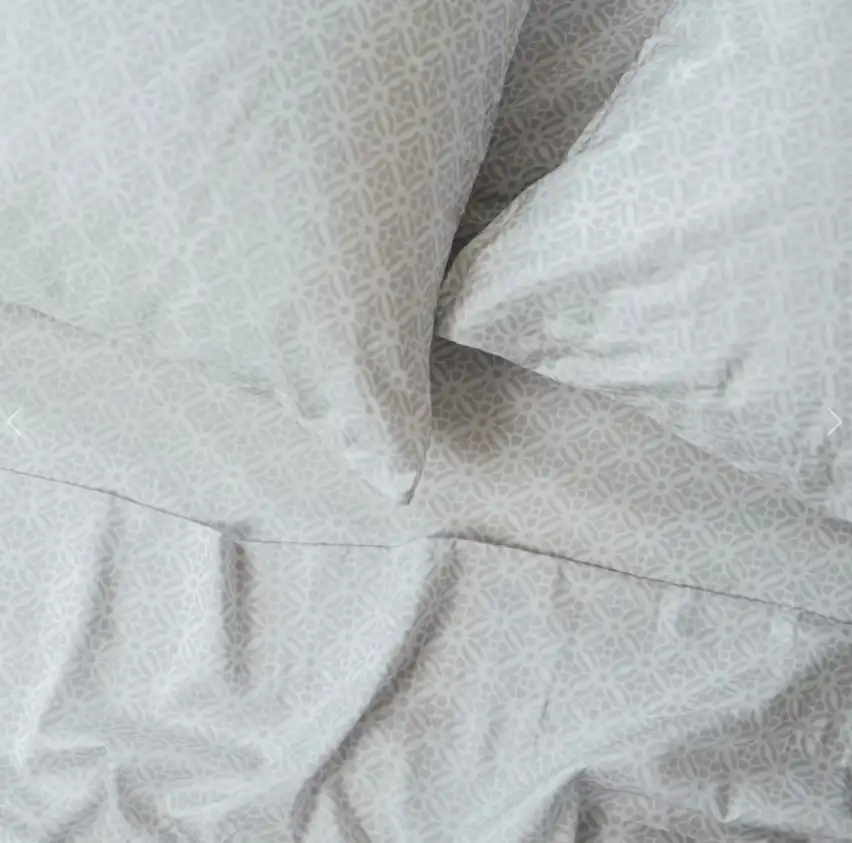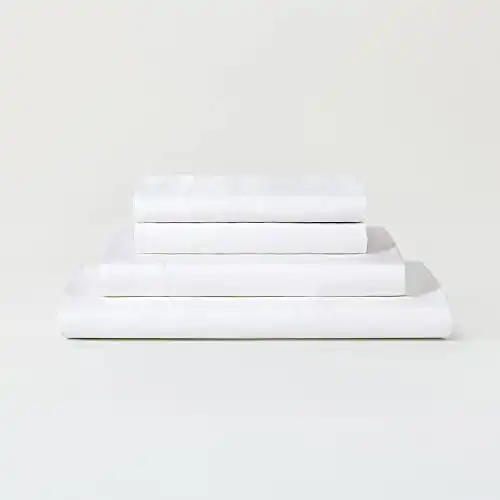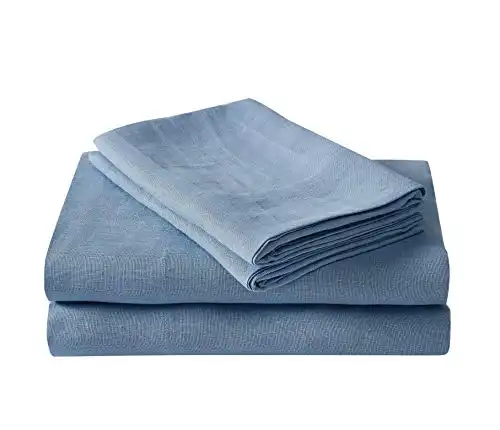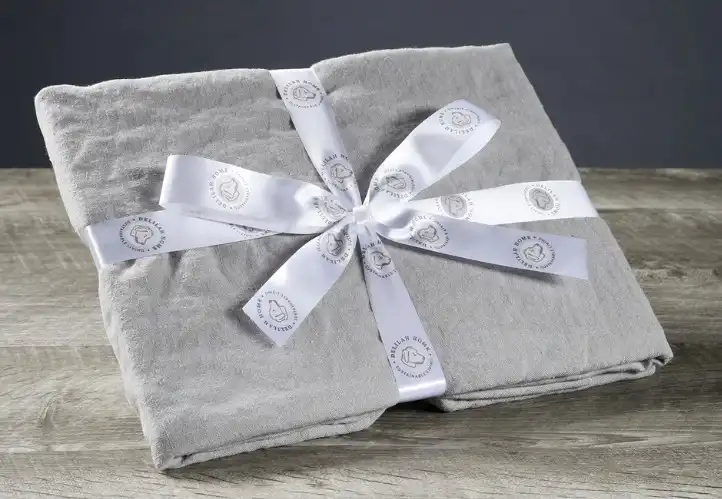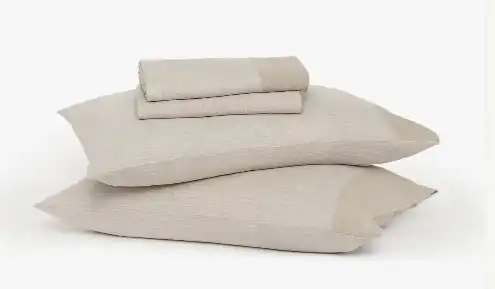- You are here:
- Home »
- Organic Bedding »
- Cotton Polyester Blend Sheets: Pros and Cons
Cotton Polyester Blend Sheets: Pros and Cons
When it comes to choosing the perfect bedding, one of the most common options is cotton polyester blend sheets. These sheets combine cotton’s softness and breathability with polyester’s durability and wrinkle resistance.
However, there are several factors that need to be considered before investing in this type of bedding. This article will explore the pros and cons of cotton polyester blend sheets and highlight the potential environmental and health concerns associated with polyester.
We will also discuss alternative options such as 100% organic cotton sheets, eucalyptus sheets, or hemp sheets that offer a more eco-friendly and sustainable choice.

Pros of Cotton Polyester Blend Sheets
Durability
One of the major advantages of cotton polyester blend sheets is their durability. Polyester fibers are known for their strength and resistance to wear and tear. This means that these sheets tend to last longer and hold up well over time compared to pure cotton sheets.
Wrinkle Resistance
Another benefit of polyester is its ability to resist wrinkles. Cotton polyester blend sheets are less likely to crease and require less ironing or maintenance, making them a convenient option for those who prefer low-maintenance bedding.
Affordability
Cotton polyester blend sheets tend to be more budget-friendly than other sheets. The combination of cotton and polyester materials allows for a lower production cost, making them a more affordable option for consumers. These sheets cost around half the price of 100% cotton sheets.
Variety
Cotton polyester blend sheets are available in an array of colors, patterns, and designs. This makes it easy for consumers to find sheets that match their aesthetic preferences and bedroom decor.
Easy Care
These sheets are machine-washable and dry quickly, reducing the amount of time spent on laundry. Their resistance to shrinking also guarantees a good fit even after numerous washes.
|
$84.99
|
$58.99
|
|
Cons of Cotton Polyester Blend Sheets
Potential Toxicity of Polyester
While polyester offers certain advantages, it is important to note that it is a synthetic material derived from petrochemicals. Some studies suggest that polyester can release potentially harmful chemicals, such as phthalates, VOCs (volatile organic compounds), and formaldehyde, especially when exposed to high heat.
These chemicals may cause skin irritation or respiratory issues, particularly for individuals with sensitivities or allergies.
Microplastic Pollution
Polyester is a type of plastic, and when polyester fabrics are washed, they can shed microfibers that contribute to microplastic pollution in our waterways.
These microfibers are extremely tiny and can pass through wastewater treatment plants, ending up in rivers, lakes, and oceans, posing a threat to aquatic life and the overall ecosystem.
Not Eco-Friendly
Polyester is a synthetic material that is derived from non-renewable resources, such as crude oil. Its production process consumes significant amounts of energy and contributes to greenhouse gas emissions. Moreover, polyester is not biodegradable and can persist in the environment for hundreds of years, adding to the problem of plastic waste.
Heat Trapping
Polyester does not have the same breathability as natural fibers like cotton. Cotton polyester blend sheets may trap heat and moisture, leading to discomfort during hot weather or causing night sweats for some individuals.
Loss of Softness
The blend of cotton and polyester can cause the sheets to become less soft over time, as cotton fibers tend to break down faster than polyester. This is especially true for cheaper blends with a higher proportion of polyester.
Read More: Cotton vs Polyester Sheets
Alternatives to Cotton Polyester Blend Sheets
100% Organic Cotton Sheets
Opting for 100% organic cotton sheets is an excellent alternative to cotton polyester blends. Organic cotton is grown without the use of harmful pesticides or synthetic fertilizers, promoting healthier farming practices and reducing exposure to potentially harmful chemicals.
Organic cotton sheets also tend to be softer and more breathable, providing a comfortable, eco-friendly bedding choice. Be sure to choose GOTS-certified organic cotton sheets to ensure that the product is truly organic.
|
|
$198
|
$299
|
Eucalyptus Sheets
Eucalyptus sheets are made from sustainably sourced eucalyptus fibers. The production process involves using a closed-loop system that recycles solvents and minimizes waste.
Eucalyptus sheets offer a silky smooth texture, excellent breathability, and are naturally hypoallergenic, making them ideal for those with sensitive skin or allergies.
|
$110.00
|
$169
|
$89.95
|
Hemp Sheets
Hemp sheets are made from the fibers of the hemp plant, which is known for its strength, durability, and sustainability. Hemp requires fewer pesticides and water compared to other crops, making it an eco-friendly choice.
Hemp sheets offer excellent breathability, and moisture-wicking properties, and become softer with each wash.
|
3.5
|
3.5
|
3.5
|
|
N/A
|
$249
|
$249
|
Conclusion
Cotton polyester blend sheets may offer certain advantages in terms of durability, wrinkle resistance, and affordability. However, it is important to consider polyester’s potential toxicity, microplastic pollution, and its non-eco-friendly nature. 100% organic cotton sheets, eucalyptus sheets, or hemp sheets are recommended for those seeking a more sustainable and healthier bedding option.
These alternatives provide comfort, and breathability, and are produced using more eco-friendly practices. By making an informed choice, we can contribute to a greener and healthier planet while enjoying a good night’s sleep.
About the Author Kamila Flieger
My name is Kamila, and I'm passionate about researching non-toxic, organic products for the home. I believe it's so important to create a safe and healthy environment for our families, and I enjoy helping others do the same.

